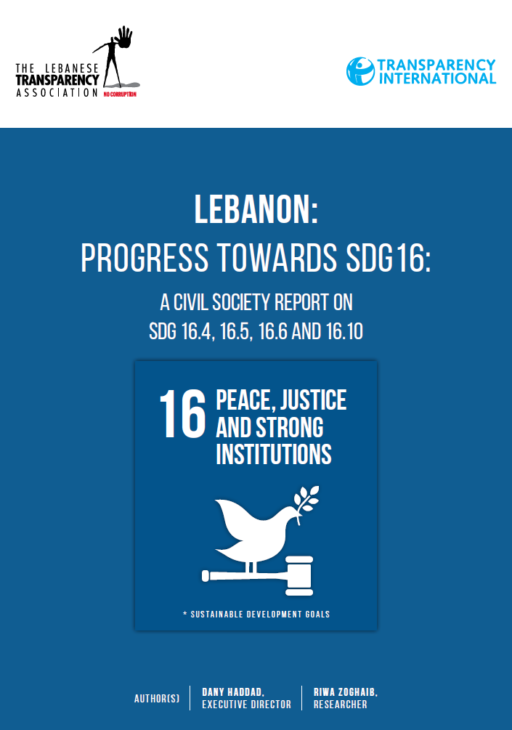Lebanon: Progress Towards Sustainable Development Goal 16
Description
This Sustainable Development Goals (SDGs) parallel report offers an independent review of the government-led 'National Voluntary Review' process in Lebanon.
Produced for the occasion of the United Nations High-Level Political Forum (HLPF) meeting in New York in July 2018, this assessment attempts to provide an objective account of the progress made within the 2030 Agenda for Sustainable Development in Lebanon.
The report provides independent analysis to complement and scrutinise official government progress reports related to SDG targets that focus directly on corruption. It provides a comprehensive picture of national anti-corruption progress across a range of policy areas. More specifically, targets 16.4 (illicit financial and arms flows), 16.5 (reduce bribery and other forms of corruption), 16.6 (transparent and accountable institutions) and 16.10 (access to information) are analysed in depth. The report includes a number of policy recommendations to make headway against corruption in Lebanon.
Recommendations
Target 16.4:
- Lebanese legislators should develop a well consolidated definition of beneficial ownership that can be adopted in the commercial law as well as in the banking and financial regulations. Additionally, the beneficial ownership chapter should specify the competent authorities that can have access to beneficial ownership information in case the information was not available to the public.
- Banks should develop clear guidelines allowing them to conduct enhanced Due Diligence for their customers or beneficial owners of PEPs or their family members or even for their close associates
- Banks in Lebanon should be able to determine the beneficial owner of the accounts, to conduct an identity verification process to transient clients, keep record of all documents related to the completed operations or to closing accounts.
- Banks should also develop indicators that can reveal the existence of money-laundering cases and to apply the due diligence that lead to suspicious operations detection. A money laundering risk assessment for legal persons and arrangements should be established.
- Lebanon should establish a national asset recovery unit/team backed-up with a well-defined policy to recover illicit assets.
Target 16.5:
- Lebanon still needs to double the efforts when it comes to promoting the independence of regulatory authorities and the judiciary, among other things, that might also need to be considered as crucial components of its effective fight against corruption.
- Lebanon should criminalize the bribery of foreign public officials and should work on developing the law that prohibits collusion in public tender. Additionally, Lebanon should establish a legal framework for lobbying.
- The legal framework regulating the financing of political parties and the candidates in Lebanon lacks some crucial components and some transparency and accountability standards. For instance, political parties and individual candidates are not required by law to disclose financial statements for their campaigns detailing itemized income and expenditure, as well as individual donors to their campaign finances additionally, they are not required to disclose annual accounts with itemized income and expenditure and individual donors.
- Annual accounts of political parties are not subject to independent scrutiny in Lebanon. There have not been any sanctions for violating political financing rules or non-compliance with disclosure requirements in the past two years.
Target 16.6:
- Banks and prosecution authorities should have an absolute right to access the data regarding the PEPs bank accounts for enhanced Due Diligence procedures. All information on bank accounts, especially when subject to public interest, should be made accessible to the public in all cases as a matter of guaranteeing actual fiscal transparency and fighting illicit enrichment.
- The Lebanese Transparency Association is lobbying for the passage of the whistle-blowing protection law. A draft law on whistle-blower protection has been adopted by the parliament’s joint committees and awaiting to be adopted by the General Assembly to enter into force.
Target 16.10:
- Lebanon should enforce the Access to Information law and implement it properly as it can play a major role in the fight against corruption.
Authors
Dany Haddad, Executive Director.
Riwa Zoghaib, Researcher.
Date
17/09/2018
Tags
 Download PDF
Download PDF
